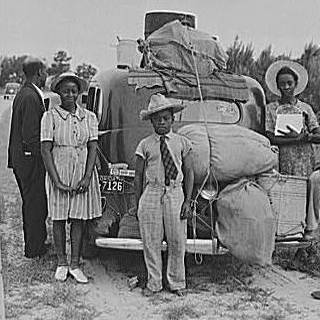 The Great Migration of African Americans from the South to urban areas of the North during the 20th century gave major impetus to social reforms, racial integration, voting rights, and civil rights. But a new study by researchers at Duke University, the University of Chicago, the University of Michigan, and Carnegie Mellon University finds that not everything about the Great Migration was good.
The Great Migration of African Americans from the South to urban areas of the North during the 20th century gave major impetus to social reforms, racial integration, voting rights, and civil rights. But a new study by researchers at Duke University, the University of Chicago, the University of Michigan, and Carnegie Mellon University finds that not everything about the Great Migration was good.
In fact, the study found that Blacks who moved North ended up having higher mortality rates. The study found that if an African-American man lived to age 65 the chances that he would make it to age 70 if he remained in the South were 82.5 percent; if he migrated to the North the chance of surviving to age 70 dropped to 75 percent — about a 40 percent increase in mortality.
For an African-American woman who lived to age 65, the chances that she would make it to age 70 if she remained in the South were 90 percent; if she migrated to the North, the chance of surviving to age 70 dropped to 85 percent — about a 50 percent increase in mortality.
Seth G. Sanders, a professor of economics at Duke University and a co-author of the study stated that there is “something about living in the city, it’s very stressful and as a result, people pick up bad habits they think will ease that stress, like smoking and drinking.” Stress and these bad habits can lead to cardiovascular disease, lung cancer, and liver disease, impacting mortality rates.
The authors note that their historical study has implications for similar migrations that are taking place in the developing world. As millions of people in Africa and Asia leave rural locations for urban areas, they may be subjected to the same stresses that Black Americans faced in the urban North.
“The Impact of the Great Migration on Mortality of African Americans: Evidence from the Deep South,” appears in the February issue of American Economic Review. It may be accessed here.


I disagree with this study on numerous fronts. Point one: the universities involved in this study have a long storied history of using the Black/African-American community as intellectual guinea pigs to advance their institutional, individual, and White monocultural world view as the standard (nothing could be further from the truth). Point two: Black/African-Americans who ventured “Upsouth” (e.g., the North) had a higher incidence rate of contracting various diseases due to White American racism via institutions, structures, and individuals (similarly as what Black/African-Americans experience across this country in a current context). Point three: Instead of placing the onus on Black/Africa-Americans, the focus should be placed on the White controlled institutions that created the pollution or contaminated the water supply, sold rotten food, administered questionable medical, dental, or benign neglect regarding home mortgages (can you say, Federal Home Owners’ Loan Corporation (HOLC) Maps [Redlining Maps]. In fact, all of the aforementioned still applies today as well. Point three: when Blacks/African-Americans have a closer interaction with the empirically dominant Whites (e.g. within a US context of course), they increase their probability of developing the same human diseases normally affiliated with White Americans.
Final point, when any group decides to leave a rural area that have a robust communal network to a congested urban area will generally have negative outcomes. What the authors should have dutifully noted the impact of accelerated globalization and corporate greed along with neoliberalism is having a deleterious impact on the entire planet.
Michael: Very well said you took all my thunder! The flawed establishment scholars at the above institutions have to justify their existence so they use Black/African Americans as guinea pigs to perpetuate their false inaccurate assertions which are geared to get predicted outcomes.
This whole study was a total farce.